The Common Vein Copyright 2008
Introduction
Ultrasound is the study of choice in almost all instances of suspected gallbladder disease. A HIDA scan is more sensitive and specific for acute cholecystitis, but is unable to provide structural detail of the gallbladder, its contents nor its surrounding structures. Ultrasound has a special capability of defining fluid filled structures or disease processes and the fasting gallbladder provides a cystic window to the contents and the wall of the gallbladder often the anatomic origin of disease.
Introduction
Principles
Ultrasound utilizes high frequency waves generated from the interaction of electrical energy with piezoelectrical crystal. The piezoelectrical crystals are ceramic crystals that deform when the electrical current passes through them, and this causes a rapid (high frequency) change in their shape. A high frequency vibration is created in the form of sound waves in the 1-20MHz range. These waves can propogate through tissues and will either be transmitted or reflected depending on the nature of the tissue. When these echoes return the kinetic energy that they contain is converted back to electrical energy which when energy is relatively high is reflected on the screen as bright signal (white), when intermediate strength it is gray, and when there is no gignal it is black.
Tissue Characterization
The energy that returns is a reflection of the nature of the tissue it has interracted with. If the sound wave returns from a particular position with almost none of the energy it left with, then there has been little attenuation of the sound wave and this occurs when the sound wave has passed through a fluid structure or a cyst. The resulting image has no echoes reflected on the screen. If the signal returns with half the original strength then part has been refllected and part transmitted or absorbed, which may for example indicate a soft tissue structure, and an intermediate signal is seen on the screen. If the signal returning has a lot of energy on returning, then most of the signal has been reflected and a bright signal ensues. This occurs when sound interacts with bone or air. In these instances there is very little signal allowed to pass through the more posterior tissue,s preventing the sound waves from interacting with deeper tissues and hence they cannot be imaged.. This phenomenon is called shadowing.
Time
Speed Distance and the Image
In general the speed with which ultrasound travels through tissues is fairly uniform. Hence the time it takes to to travel and return is a reflection of the depth of the tissue. The This is an important principle to understand because it helps create the image
Impedence
Sound propagates through different materials at different velocities. The velocity is dependent upon the density of the material. For soft tissues, pulse velocity is approximately constant and taken to be 1540 m/s; Reflection occurs when the pulse passes between interfaces with differing acoustic impedances; The more dense a structure the greater its acoustic impedence. The larger the difference in impedance between two adjacent structures, the more sound is reflected. Reflection is also optimized when the interface is aligned perpendicular to the direction of pulse.
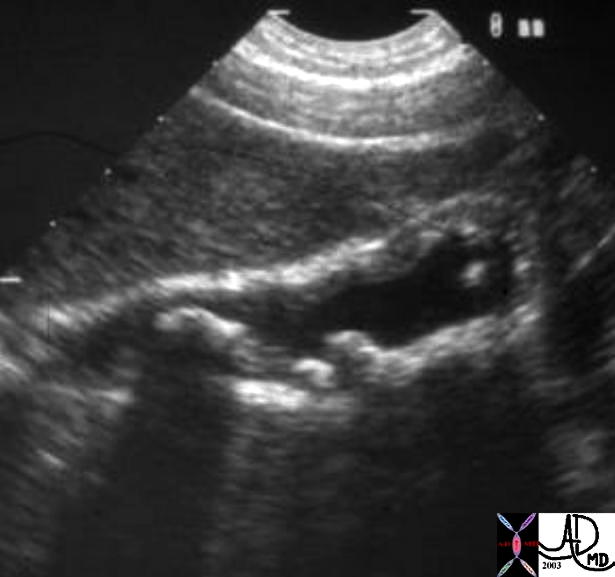 Shadowing Shadowing |
| Two principles are demonstrated in this ultrasound of the gallbladder. The first is the cystic nature of the gallbladder so that it projects as a mostly anechoic structure. The second is shadowing. The presence of gallstones is characterized by multiple echogenic interfaces where sound waves are almost completely reflected, creating both a strong echogenic interface with the stone and shadowing posterior to the stones.
00138 gallbladder small large dependant cholelithiasis thickwalled contracted thickening chronic cholecystitis imaging radiology USscan |
Cystic vs Solid
One of the most important roles that ultrasound plays is differentiating cystic from solid disease. Solid tissue has internal structures that have differing acoustic characteristics and reflect the sound waves. A simple cyst is a common entity, containing pure fluid, contains no internal structures and therefore the sound waves passing throigh it go unimpeded manifesting as a anechoic, and black structure.
When the pulse reaches the far side of the cyst, there is a fluid-solid interface which reflects brightly and gives rise to posterior or back wall enhancement. Furthermore, because the signal has not been attenuated while passing through fluid, larger cysts will allow a greater amount of sound energy to penetrate deeper. When the sound energy reaches solid tissue deep to the cyst, small amounts of the pulse are reflected back due to internal reflectors, but appear brighter on the image than adjacent solid tissue in which the reflected sound is weaker because less sound energy penetrated as deeply. This phenomenon is called increased through transmission.
In summary, cyst on ultrasound are characterized by:
- Anechoic
- Posterior wall enhancement
- Increased through transmission
Doppler
Doppler ultrasound utilizes the Doppler principle to detect flow. When sound pulses are reflected off moving substance (such as blood), there is a shift in frequency; The shift in frequency is greater if the substance is moving toward the transducer, and lower if it is moving away. On the ultrasound image, this can be displayed as a waveform (pulsed Doppler waveform ) or as colors on the image (one color for motion towards transducer, and another color for motion away from transducer).
Power Doppler refers to detection of motion but not direction. A single color is displayed on the image for all motion, with low brightness for slow movement and high brightness for rapid motion. It is more sensitive than color Doppler but lack the information on direction.
Practical applications of color Doppler include assessing lesions for vascular flow, which may better characterize or diagnose the lesion. Stenoses in vessels or grafts can be detected, since flow velocity increases with narrowing in vessels. Pseudoaneurysms can be differentiated from hematomas, as there is a typical ?Yin-yang? flow of blood into and out of the lesion.
 Acute Calculous Cholecystitis wit Gallbladder Wall Edema and Hyperemia Acute Calculous Cholecystitis wit Gallbladder Wall Edema and Hyperemia
Using color flow to determine hyperemia and inflammation |
| The ultrasound images are from a patient who presents with right upper quadrant pain. Images a and b show gallstones, thickened wall and complex changes in the gallbladder fossa and image c shows hyperemic changes in the gallbladder wall as depicted by doppler technique. The presence of all the findings characterize the disease and are characteristic of acute cholecystitis.
72365c01 gallbladder wall fluid in gallbladder fossa positive sonographic Murphy’s sign inflammation mechanical obstruction infection hyperemia hypervascularity dx acute calculous cholecystiis Davidoff MD |
Aim
The aim of diagnostic sonography is to characterize lesions, document anatomy and, where appropriate, function of the tissues being imaged whilst keeping the cumulative sound energy delivered ALARA (as low as reasonable achieveable). The purpose of ultrasound of the gallbladder is to define the size shape position and character of the gallbladder, and also to determine if there is gallbladder tenderness.
Indications
Ultrasound is the procedure of choice in patients who present with right upper quadrant pain, in whome acute cholecystitis, acalculous cholecystitis is suspected. In ppartients in whom gallstone pancreattitis issuspected ultrasound is utilized to document the presence of stones.
Contraindications
There are no absolute medical contraindications to ultrasound. It is generally considered to be a safe procedure without significant side-effects. There is a small theoretical risk of damage to tissues from heating, which has been demonstrated with extreme doses in animal studies. As such, the examination is performed following the ALARA principle (keeping exposure As Low As Reasonably Achieveable).
Advantages
Ultrasound presents numerous advantages. First, it is fast and requires little preparation. It can be performed in real time, and is useful for visualize moving structures (heart, fetus), as well as visualizing live structures during interventional procedures. The machines used to perform ultrasound are extremely portable, and cheap in comparison to other imaging modalities. It carries few, if any, side-effects, produces no ionizing radiation, and is safe for use in pregnancy, as well as with delicate organs. Lastly imaging can be performed in any plane.
In the gallbladder, US is particularly useful for evaluating and diagnosing gallstones, acute cholecystitis and acalculous cholecystitis as well as non biliary causes for right upper quadrant pain.
Disadvantages
Ultrasound is not effective in visualizing bone or air-filled structures. In addition, visualizing deep structures is often only possible at the expense of quality and resolution. Finally, the quality of studies produced is highly operator-dependent.
Method
Patient Preparation
Patients should be fasting for 8 hours before abdominal examination. This both minimizes gas within the bowel which may obscure organs and allows examination of a non-contracted gallbladder; post prandial contraction of the gallbladder may conceal pathology such as intramural lesions or stones.
Equipment
Ultrasound equipment consists of a monitor, control panel and transducer (probe). The entire unit is typically wheeled and portable. Ultrasound machines typically have a number of different transducers, which differ in frequency of pulses generated and shape of the probe (and hence the shape of the image ? sector versus rectangle). Machines routinely used for diagnostic exams are relatively large, but much smaller units are available and are sometimes used in emergency rooms, physician offices and intensive care units for non-diagnostic assessment of, for example, bleeding in early pregnancy, musculoskeletal pain or obtaining intravenous access.
Technique
The transducer is applied firmly against the patient using acoustic gel to improve transmission of the sound waves. The orientation of the transducer determines the imaging plane. The operator will use the images on the monitor to move and rotate the transducer until the organ or tissue of interest is visualized. The image may be optimized on the monitor by altering frequency, gain, focal zone, filed of view and grey-scale curves. Static images are typically saved, though a series of frames may be recorded in certain examinations (echocardiography) in order to evaluate motion of the organ over time.
Patients are typically places in the supine, position, with additional semierect, left posterior oblique and right posterior oblique positions being used. A water-soluble gel is applied to transducer, as well as to the surface of skin being imaged. For visualizing the gallbladder, the transducer will typically be placed on the right upper quadrant of the abdomen, angling superiorly to visualize the gallbladder. In cases of cholecystitis, a sonographic murphy?s sign is elicited when the transducer is pushed up into the liver while the patient exhales. If the patient stops breathing or winces, this is considered a positive sign.
Result
In cases where acute cholecystitis is suspected, US has replace HIDA scan as the first line study, where the presence of gallstones and presence of murphy?s sign are virtually diagnostic.
Examples of US of the Gallbladder in Various Diseases
Choledocholithiasis
Small Stones
 Crystalline Floaters Crystalline Floaters |
| 77753c01.8s young female right upperquadrant tenderness RUQ gallbladder echogenic irregular fluid fluid layer conforming to the shape of the gallbladder wall thickened linear echoes floaters crystalline SG less than bile cholesterol crystals specific gravity forces space cholelithiasis stones small acute cholecystitis USscan ultrasound Courtesy Ashley Davidoff MD For Radiologists and Detectives |
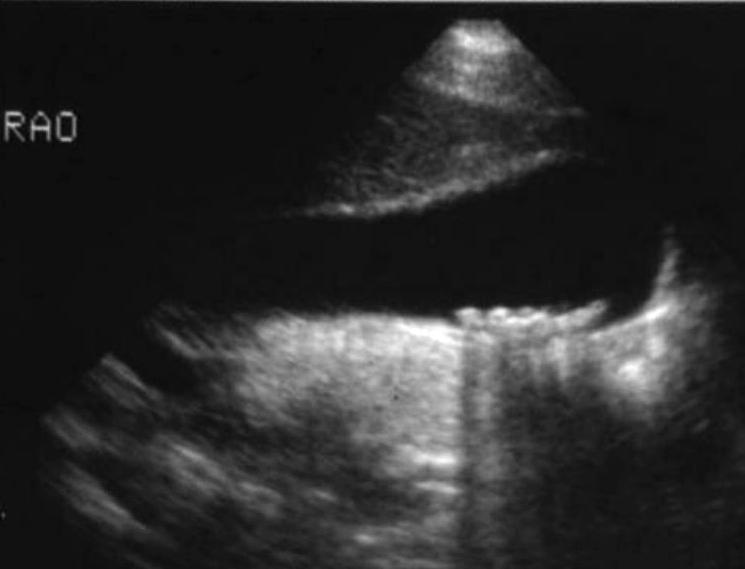 Small Shadowing Stones Small Shadowing Stones |
| 04753 gallbladder small gallstones shadowing cholelithiasis USscan Davidoff MD |
Intermediate Sized Stones
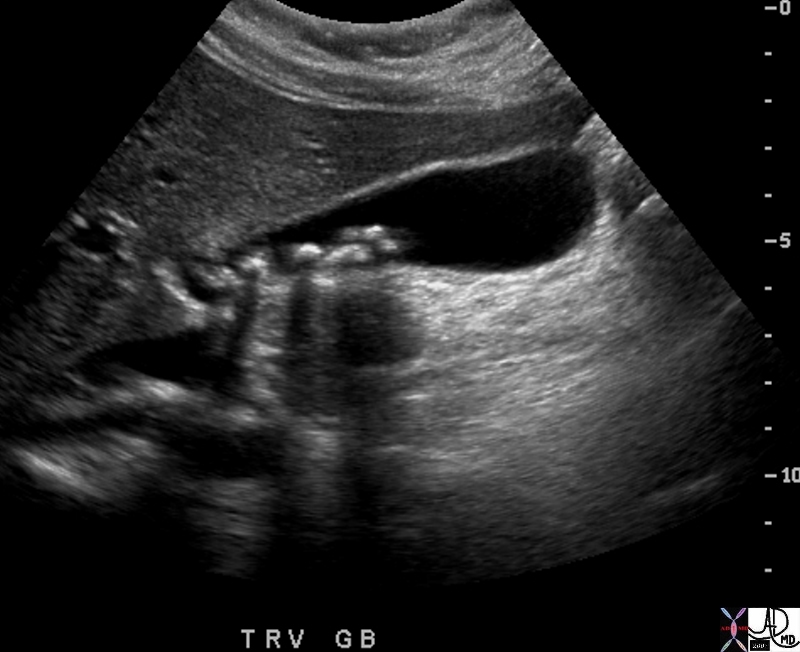 Multiple Medium Sized Shadowing Stones Multiple Medium Sized Shadowing Stones |
| 70026 gallbladder stones shadowing forces reflection transmission dx cholelithiasis USscan Davidoff MD |
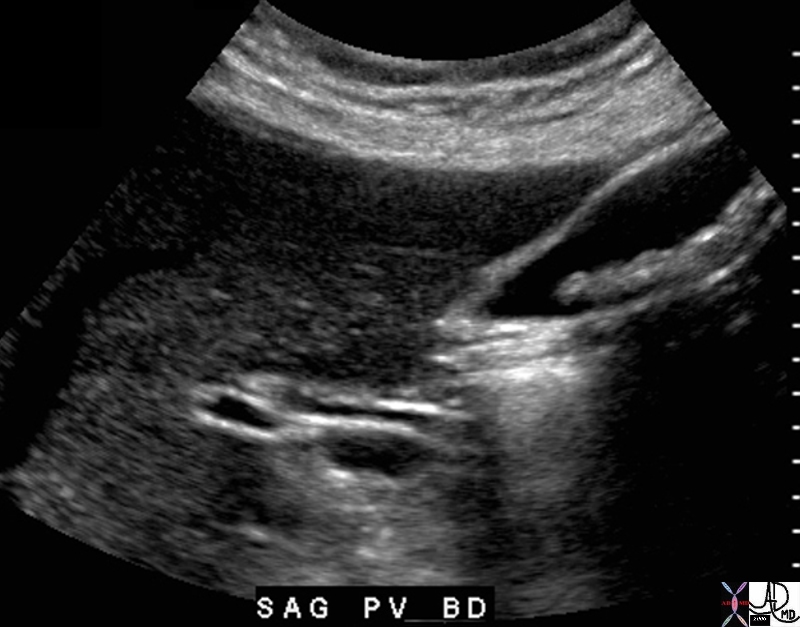
Multiple Medium Sized Stones
|
|
76040b01 gallbladder stones cholelithiasis bile duct normal portal vein liver vein USscan Courtesy Ashley DAvidoff MD
copyright 2008
|
Large Stones

Mobile Stone
|
| 46462c01s gallbladder moderaste size shadowing mobile stones cholelithiasis USscan ultrasound Courtesy Ashley Davidoff MD copyright 2008 |
Sludge

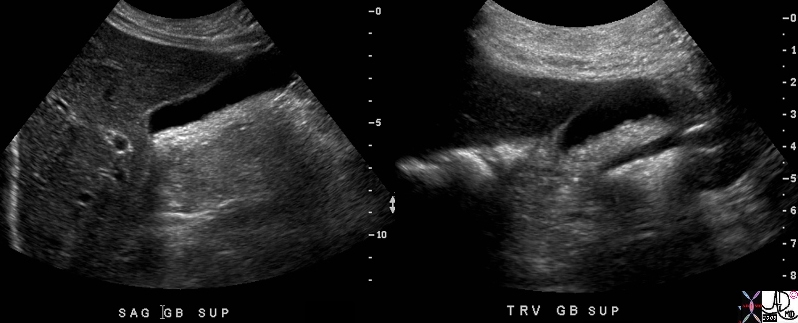
Sludge – Almost Fluid
|
| 78365c.8s gallbladder sludge cholestasis fluid fluid level USscan ultrasound Courtesy Ashley Davidoff MD copyright 2008 |
Acute Cholecysttis

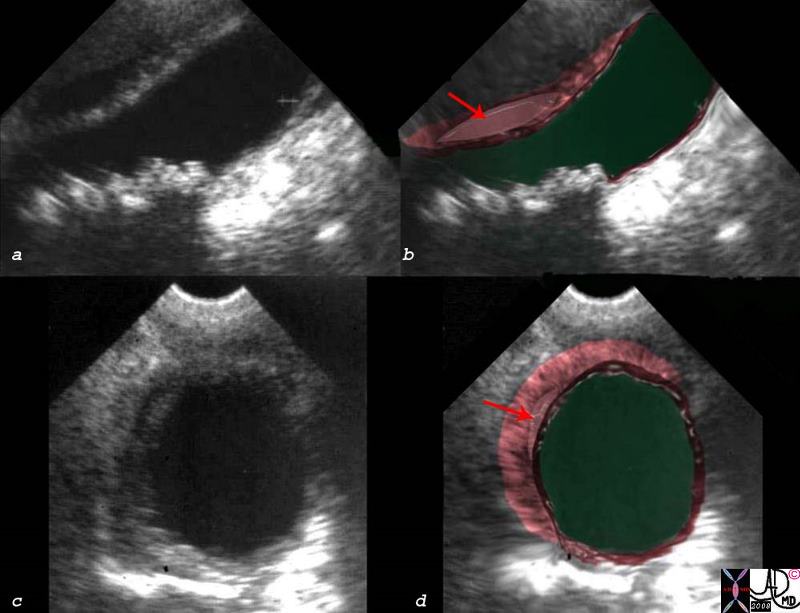
Fluid and Thickening in the Gallbladder Fossa
|
| 00543c03s.8 right upper quadrant pain RUQ pain positive Murphy’s sign gallbladder gallbladder fossa thickened linear lacy thickening gall stones calculi calculous multiple small stones stones dependant position shadowing multiple small stones cholelithiasis cholecystitis acute cholecystitis acute calculous cholecystitis USscan ultrasound Courtesy Ashley Davidoff MD copyright 2008 |
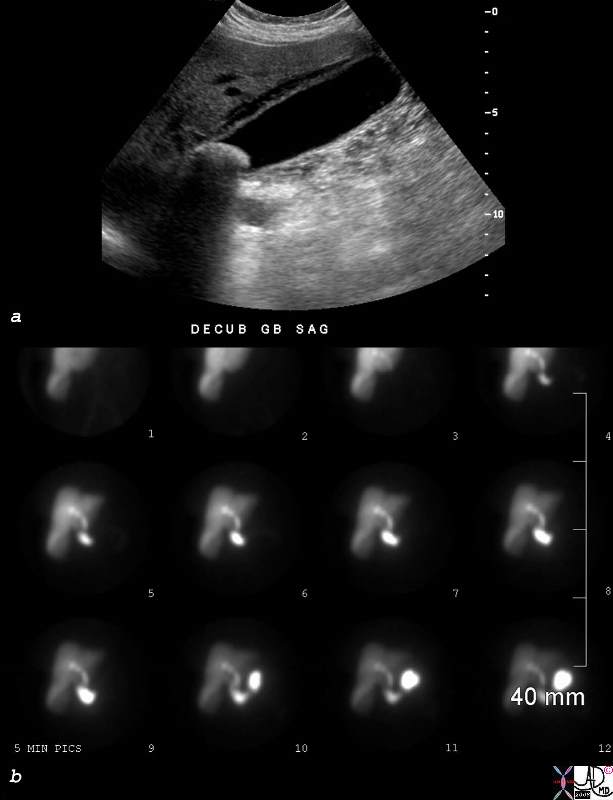
Positive HIDA scan
|
| young female vague right upper quadrant pain non distended gallbladder complex fluid in the gallbladder fossa large stone cholelithiasis non visualization non viz radioactive labelled technetium HIDA scan non visualization of the gallbladder at 45 minutes biliary system visualized at 30 minutes consistent with acute cholecystitis
78306c01.8s nuclear medicine Courtesy Ashley Davidoff MD copyright 2008 |
WES sign
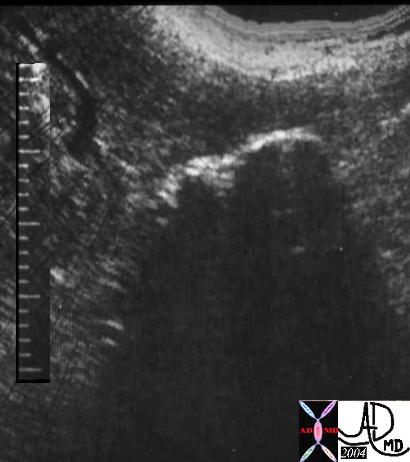 WES sign WES sign |
| 04733 gallbladder filling defects stones cholelithiasis WES sign USscan imaging radiology |
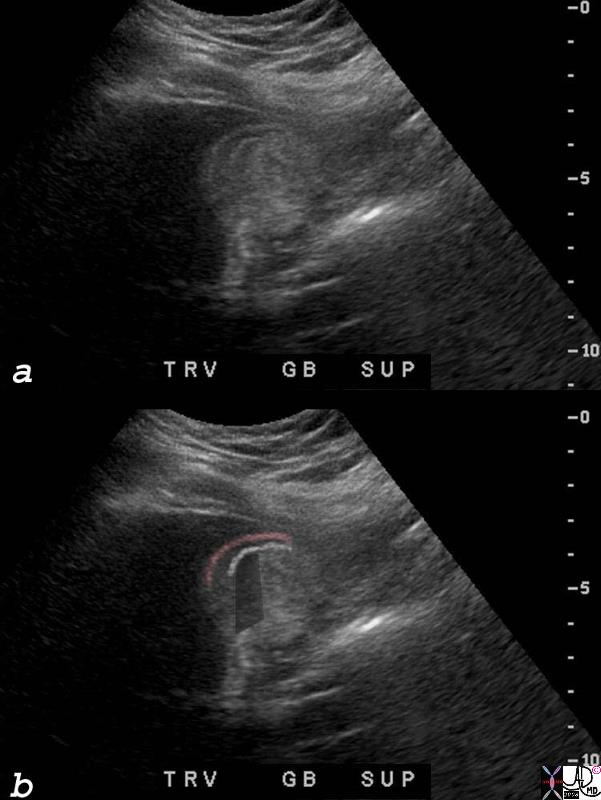 WES sign WES sign |
| 82166c01s 27F gallbladder stone cholelithiasis WES sign wall = pink line echo = white line = front anterior echo of the stone black shadow = shadow of the large stone shadow USscan ultrasound Courtesy Ashley Davidoff MD copyright 2008 Courtesy Ashley Davidoff MD Copyright 2008 |
HIV cholangiopathy
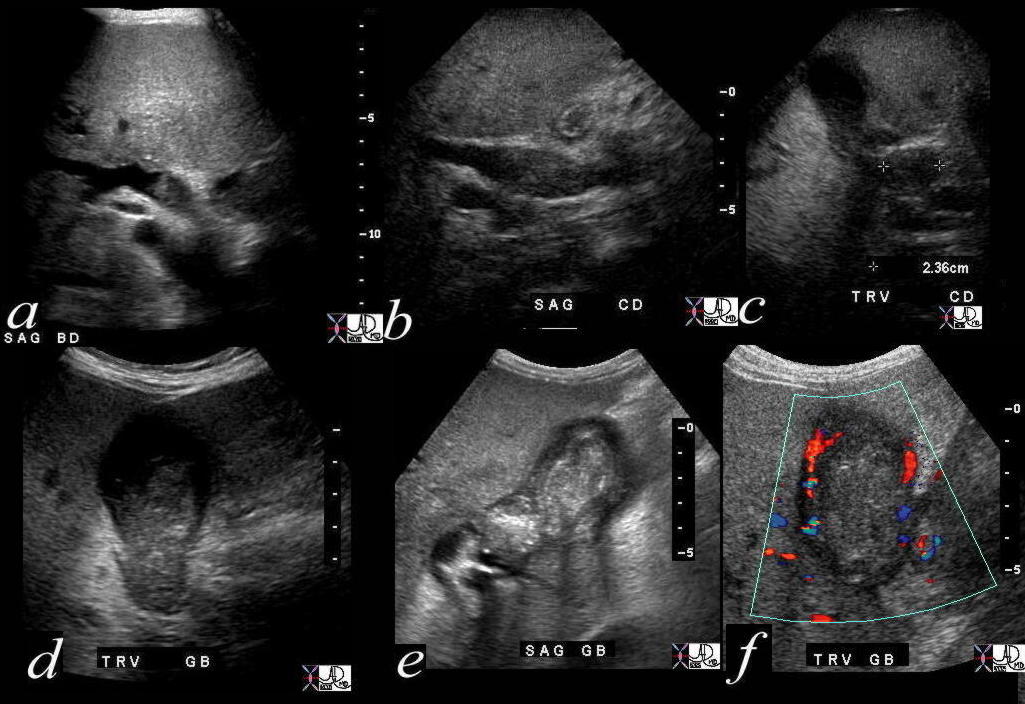 Cholecystitis probably Cryptosporidium Cholecystitis probably Cryptosporidium |
| 41257c005 Courtesy Ashley Davidoff MD code gallbladder filling defect question sludge fx hyperemic wall bile duct filling defect question sludge fx enlarged dilated dx HIV cholangiopathy chronic cholecystitis subacute cholecystitis imaging radiology USscan mechanical inflammation |
Carcinoma
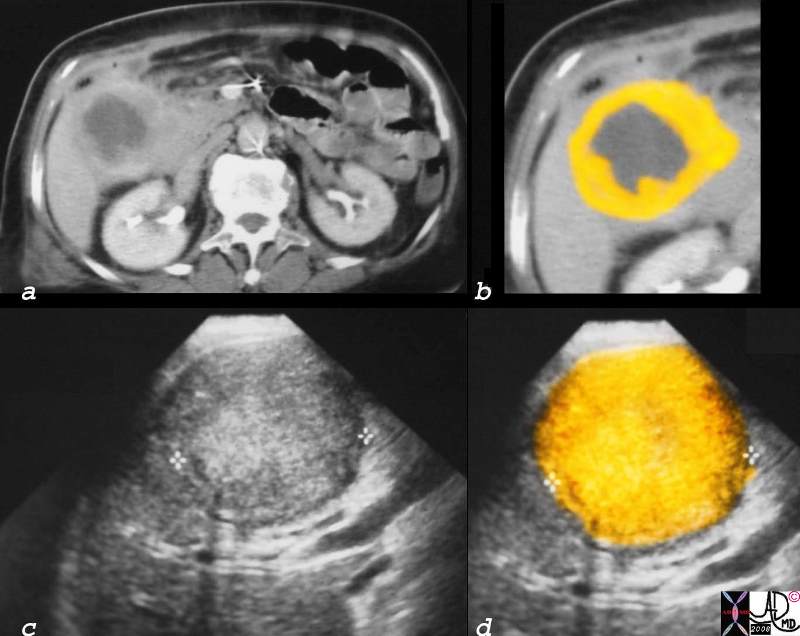 Lumenal Invasion Lumenal Invasion |
| 16254c04.8s gallbladder space occupation gallbladder carcinoma by CT it appears as a low density centrally and enhancing soft tissue peripherally by USscan looks like the whole lumen is filled with soft tissue tumor question of delayed tumor enhancement vs necrosis CTscan USscan ultrasound Courtesy Ashley Davidoff copyright 2008 |
Conclusion
Ultrasound is a safe and cost-effective examination for a wide range of imaging indications. Doppler ultrasound further increases the applications, and allows for accurate assessment of a variety of vascular disorders and characterization of anatomical lesions. Endoscopic ultrasound is a powerful tool for imaging structures too deep to accurately visualize externally. Future applications may include intravascular use for assessment of atheromatous plaque in cardiovascular disease, and wider use of microbubbles as contrast.
References
Novelline: Squire?s Fundamentals of Radiology
Scoutt: Ultrasound Evaluation of the Acute Abdomen
Web References
Galllbladder Ultrasonography Procedure MAnual .gov

DOMElement Object
(
[schemaTypeInfo] =>
[tagName] => table
[firstElementChild] => (object value omitted)
[lastElementChild] => (object value omitted)
[childElementCount] => 1
[previousElementSibling] => (object value omitted)
[nextElementSibling] => (object value omitted)
[nodeName] => table
[nodeValue] =>
Lumenal Invasion
16254c04.8s gallbladder space occupation gallbladder carcinoma by CT it appears as a low density centrally and enhancing soft tissue peripherally by USscan looks like the whole lumen is filled with soft tissue tumor question of delayed tumor enhancement vs necrosis CTscan USscan ultrasound Courtesy Ashley Davidoff copyright 2008
[nodeType] => 1
[parentNode] => (object value omitted)
[childNodes] => (object value omitted)
[firstChild] => (object value omitted)
[lastChild] => (object value omitted)
[previousSibling] => (object value omitted)
[nextSibling] => (object value omitted)
[attributes] => (object value omitted)
[ownerDocument] => (object value omitted)
[namespaceURI] =>
[prefix] =>
[localName] => table
[baseURI] =>
[textContent] =>
Lumenal Invasion
16254c04.8s gallbladder space occupation gallbladder carcinoma by CT it appears as a low density centrally and enhancing soft tissue peripherally by USscan looks like the whole lumen is filled with soft tissue tumor question of delayed tumor enhancement vs necrosis CTscan USscan ultrasound Courtesy Ashley Davidoff copyright 2008
)
DOMElement Object
(
[schemaTypeInfo] =>
[tagName] => td
[firstElementChild] =>
[lastElementChild] =>
[childElementCount] => 0
[previousElementSibling] =>
[nextElementSibling] =>
[nodeName] => td
[nodeValue] => 16254c04.8s gallbladder space occupation gallbladder carcinoma by CT it appears as a low density centrally and enhancing soft tissue peripherally by USscan looks like the whole lumen is filled with soft tissue tumor question of delayed tumor enhancement vs necrosis CTscan USscan ultrasound Courtesy Ashley Davidoff copyright 2008
[nodeType] => 1
[parentNode] => (object value omitted)
[childNodes] => (object value omitted)
[firstChild] => (object value omitted)
[lastChild] => (object value omitted)
[previousSibling] => (object value omitted)
[nextSibling] => (object value omitted)
[attributes] => (object value omitted)
[ownerDocument] => (object value omitted)
[namespaceURI] =>
[prefix] =>
[localName] => td
[baseURI] =>
[textContent] => 16254c04.8s gallbladder space occupation gallbladder carcinoma by CT it appears as a low density centrally and enhancing soft tissue peripherally by USscan looks like the whole lumen is filled with soft tissue tumor question of delayed tumor enhancement vs necrosis CTscan USscan ultrasound Courtesy Ashley Davidoff copyright 2008
)
DOMElement Object
(
[schemaTypeInfo] =>
[tagName] => td
[firstElementChild] => (object value omitted)
[lastElementChild] => (object value omitted)
[childElementCount] => 1
[previousElementSibling] =>
[nextElementSibling] =>
[nodeName] => td
[nodeValue] => Lumenal Invasion
[nodeType] => 1
[parentNode] => (object value omitted)
[childNodes] => (object value omitted)
[firstChild] => (object value omitted)
[lastChild] => (object value omitted)
[previousSibling] => (object value omitted)
[nextSibling] => (object value omitted)
[attributes] => (object value omitted)
[ownerDocument] => (object value omitted)
[namespaceURI] =>
[prefix] =>
[localName] => td
[baseURI] =>
[textContent] => Lumenal Invasion
)
DOMElement Object
(
[schemaTypeInfo] =>
[tagName] => table
[firstElementChild] => (object value omitted)
[lastElementChild] => (object value omitted)
[childElementCount] => 1
[previousElementSibling] => (object value omitted)
[nextElementSibling] => (object value omitted)
[nodeName] => table
[nodeValue] =>
Cholecystitis probably Cryptosporidium
41257c005 Courtesy Ashley Davidoff MD code gallbladder filling defect question sludge fx hyperemic wall bile duct filling defect question sludge fx enlarged dilated dx HIV cholangiopathy chronic cholecystitis subacute cholecystitis imaging radiology USscan mechanical inflammation
[nodeType] => 1
[parentNode] => (object value omitted)
[childNodes] => (object value omitted)
[firstChild] => (object value omitted)
[lastChild] => (object value omitted)
[previousSibling] => (object value omitted)
[nextSibling] => (object value omitted)
[attributes] => (object value omitted)
[ownerDocument] => (object value omitted)
[namespaceURI] =>
[prefix] =>
[localName] => table
[baseURI] =>
[textContent] =>
Cholecystitis probably Cryptosporidium
41257c005 Courtesy Ashley Davidoff MD code gallbladder filling defect question sludge fx hyperemic wall bile duct filling defect question sludge fx enlarged dilated dx HIV cholangiopathy chronic cholecystitis subacute cholecystitis imaging radiology USscan mechanical inflammation
)
DOMElement Object
(
[schemaTypeInfo] =>
[tagName] => td
[firstElementChild] =>
[lastElementChild] =>
[childElementCount] => 0
[previousElementSibling] =>
[nextElementSibling] =>
[nodeName] => td
[nodeValue] => 41257c005 Courtesy Ashley Davidoff MD code gallbladder filling defect question sludge fx hyperemic wall bile duct filling defect question sludge fx enlarged dilated dx HIV cholangiopathy chronic cholecystitis subacute cholecystitis imaging radiology USscan mechanical inflammation
[nodeType] => 1
[parentNode] => (object value omitted)
[childNodes] => (object value omitted)
[firstChild] => (object value omitted)
[lastChild] => (object value omitted)
[previousSibling] => (object value omitted)
[nextSibling] => (object value omitted)
[attributes] => (object value omitted)
[ownerDocument] => (object value omitted)
[namespaceURI] =>
[prefix] =>
[localName] => td
[baseURI] =>
[textContent] => 41257c005 Courtesy Ashley Davidoff MD code gallbladder filling defect question sludge fx hyperemic wall bile duct filling defect question sludge fx enlarged dilated dx HIV cholangiopathy chronic cholecystitis subacute cholecystitis imaging radiology USscan mechanical inflammation
)
DOMElement Object
(
[schemaTypeInfo] =>
[tagName] => td
[firstElementChild] => (object value omitted)
[lastElementChild] => (object value omitted)
[childElementCount] => 1
[previousElementSibling] =>
[nextElementSibling] =>
[nodeName] => td
[nodeValue] => Cholecystitis probably Cryptosporidium
[nodeType] => 1
[parentNode] => (object value omitted)
[childNodes] => (object value omitted)
[firstChild] => (object value omitted)
[lastChild] => (object value omitted)
[previousSibling] => (object value omitted)
[nextSibling] => (object value omitted)
[attributes] => (object value omitted)
[ownerDocument] => (object value omitted)
[namespaceURI] =>
[prefix] =>
[localName] => td
[baseURI] =>
[textContent] => Cholecystitis probably Cryptosporidium
)
DOMElement Object
(
[schemaTypeInfo] =>
[tagName] => table
[firstElementChild] => (object value omitted)
[lastElementChild] => (object value omitted)
[childElementCount] => 1
[previousElementSibling] => (object value omitted)
[nextElementSibling] => (object value omitted)
[nodeName] => table
[nodeValue] =>
WES sign
82166c01s 27F gallbladder stone cholelithiasis WES sign wall = pink line echo = white line = front anterior echo of the stone black shadow = shadow of the large stone shadow USscan ultrasound Courtesy Ashley Davidoff MD copyright 2008 Courtesy Ashley Davidoff MD Copyright 2008
[nodeType] => 1
[parentNode] => (object value omitted)
[childNodes] => (object value omitted)
[firstChild] => (object value omitted)
[lastChild] => (object value omitted)
[previousSibling] => (object value omitted)
[nextSibling] => (object value omitted)
[attributes] => (object value omitted)
[ownerDocument] => (object value omitted)
[namespaceURI] =>
[prefix] =>
[localName] => table
[baseURI] =>
[textContent] =>
WES sign
82166c01s 27F gallbladder stone cholelithiasis WES sign wall = pink line echo = white line = front anterior echo of the stone black shadow = shadow of the large stone shadow USscan ultrasound Courtesy Ashley Davidoff MD copyright 2008 Courtesy Ashley Davidoff MD Copyright 2008
)
DOMElement Object
(
[schemaTypeInfo] =>
[tagName] => td
[firstElementChild] =>
[lastElementChild] =>
[childElementCount] => 0
[previousElementSibling] =>
[nextElementSibling] =>
[nodeName] => td
[nodeValue] => 82166c01s 27F gallbladder stone cholelithiasis WES sign wall = pink line echo = white line = front anterior echo of the stone black shadow = shadow of the large stone shadow USscan ultrasound Courtesy Ashley Davidoff MD copyright 2008 Courtesy Ashley Davidoff MD Copyright 2008
[nodeType] => 1
[parentNode] => (object value omitted)
[childNodes] => (object value omitted)
[firstChild] => (object value omitted)
[lastChild] => (object value omitted)
[previousSibling] => (object value omitted)
[nextSibling] => (object value omitted)
[attributes] => (object value omitted)
[ownerDocument] => (object value omitted)
[namespaceURI] =>
[prefix] =>
[localName] => td
[baseURI] =>
[textContent] => 82166c01s 27F gallbladder stone cholelithiasis WES sign wall = pink line echo = white line = front anterior echo of the stone black shadow = shadow of the large stone shadow USscan ultrasound Courtesy Ashley Davidoff MD copyright 2008 Courtesy Ashley Davidoff MD Copyright 2008
)
DOMElement Object
(
[schemaTypeInfo] =>
[tagName] => td
[firstElementChild] => (object value omitted)
[lastElementChild] => (object value omitted)
[childElementCount] => 1
[previousElementSibling] =>
[nextElementSibling] =>
[nodeName] => td
[nodeValue] => WES sign
[nodeType] => 1
[parentNode] => (object value omitted)
[childNodes] => (object value omitted)
[firstChild] => (object value omitted)
[lastChild] => (object value omitted)
[previousSibling] => (object value omitted)
[nextSibling] => (object value omitted)
[attributes] => (object value omitted)
[ownerDocument] => (object value omitted)
[namespaceURI] =>
[prefix] =>
[localName] => td
[baseURI] =>
[textContent] => WES sign
)
DOMElement Object
(
[schemaTypeInfo] =>
[tagName] => table
[firstElementChild] => (object value omitted)
[lastElementChild] => (object value omitted)
[childElementCount] => 1
[previousElementSibling] => (object value omitted)
[nextElementSibling] => (object value omitted)
[nodeName] => table
[nodeValue] =>
WES sign
04733 gallbladder filling defects stones cholelithiasis WES sign USscan imaging radiology
[nodeType] => 1
[parentNode] => (object value omitted)
[childNodes] => (object value omitted)
[firstChild] => (object value omitted)
[lastChild] => (object value omitted)
[previousSibling] => (object value omitted)
[nextSibling] => (object value omitted)
[attributes] => (object value omitted)
[ownerDocument] => (object value omitted)
[namespaceURI] =>
[prefix] =>
[localName] => table
[baseURI] =>
[textContent] =>
WES sign
04733 gallbladder filling defects stones cholelithiasis WES sign USscan imaging radiology
)
DOMElement Object
(
[schemaTypeInfo] =>
[tagName] => td
[firstElementChild] =>
[lastElementChild] =>
[childElementCount] => 0
[previousElementSibling] =>
[nextElementSibling] =>
[nodeName] => td
[nodeValue] => 04733 gallbladder filling defects stones cholelithiasis WES sign USscan imaging radiology
[nodeType] => 1
[parentNode] => (object value omitted)
[childNodes] => (object value omitted)
[firstChild] => (object value omitted)
[lastChild] => (object value omitted)
[previousSibling] => (object value omitted)
[nextSibling] => (object value omitted)
[attributes] => (object value omitted)
[ownerDocument] => (object value omitted)
[namespaceURI] =>
[prefix] =>
[localName] => td
[baseURI] =>
[textContent] => 04733 gallbladder filling defects stones cholelithiasis WES sign USscan imaging radiology
)
DOMElement Object
(
[schemaTypeInfo] =>
[tagName] => td
[firstElementChild] => (object value omitted)
[lastElementChild] => (object value omitted)
[childElementCount] => 1
[previousElementSibling] =>
[nextElementSibling] =>
[nodeName] => td
[nodeValue] => WES sign
[nodeType] => 1
[parentNode] => (object value omitted)
[childNodes] => (object value omitted)
[firstChild] => (object value omitted)
[lastChild] => (object value omitted)
[previousSibling] => (object value omitted)
[nextSibling] => (object value omitted)
[attributes] => (object value omitted)
[ownerDocument] => (object value omitted)
[namespaceURI] =>
[prefix] =>
[localName] => td
[baseURI] =>
[textContent] => WES sign
)
DOMElement Object
(
[schemaTypeInfo] =>
[tagName] => table
[firstElementChild] => (object value omitted)
[lastElementChild] => (object value omitted)
[childElementCount] => 1
[previousElementSibling] => (object value omitted)
[nextElementSibling] => (object value omitted)
[nodeName] => table
[nodeValue] =>
Positive HIDA scan
young female vague right upper quadrant pain non distended gallbladder complex fluid in the gallbladder fossa large stone cholelithiasis non visualization non viz radioactive labelled technetium HIDA scan non visualization of the gallbladder at 45 minutes biliary system visualized at 30 minutes consistent with acute cholecystitis
78306c01.8s nuclear medicine Courtesy Ashley Davidoff MD copyright 2008
[nodeType] => 1
[parentNode] => (object value omitted)
[childNodes] => (object value omitted)
[firstChild] => (object value omitted)
[lastChild] => (object value omitted)
[previousSibling] => (object value omitted)
[nextSibling] => (object value omitted)
[attributes] => (object value omitted)
[ownerDocument] => (object value omitted)
[namespaceURI] =>
[prefix] =>
[localName] => table
[baseURI] =>
[textContent] =>
Positive HIDA scan
young female vague right upper quadrant pain non distended gallbladder complex fluid in the gallbladder fossa large stone cholelithiasis non visualization non viz radioactive labelled technetium HIDA scan non visualization of the gallbladder at 45 minutes biliary system visualized at 30 minutes consistent with acute cholecystitis
78306c01.8s nuclear medicine Courtesy Ashley Davidoff MD copyright 2008
)
DOMElement Object
(
[schemaTypeInfo] =>
[tagName] => td
[firstElementChild] => (object value omitted)
[lastElementChild] => (object value omitted)
[childElementCount] => 3
[previousElementSibling] =>
[nextElementSibling] =>
[nodeName] => td
[nodeValue] => young female vague right upper quadrant pain non distended gallbladder complex fluid in the gallbladder fossa large stone cholelithiasis non visualization non viz radioactive labelled technetium HIDA scan non visualization of the gallbladder at 45 minutes biliary system visualized at 30 minutes consistent with acute cholecystitis
78306c01.8s nuclear medicine Courtesy Ashley Davidoff MD copyright 2008
[nodeType] => 1
[parentNode] => (object value omitted)
[childNodes] => (object value omitted)
[firstChild] => (object value omitted)
[lastChild] => (object value omitted)
[previousSibling] => (object value omitted)
[nextSibling] => (object value omitted)
[attributes] => (object value omitted)
[ownerDocument] => (object value omitted)
[namespaceURI] =>
[prefix] =>
[localName] => td
[baseURI] =>
[textContent] => young female vague right upper quadrant pain non distended gallbladder complex fluid in the gallbladder fossa large stone cholelithiasis non visualization non viz radioactive labelled technetium HIDA scan non visualization of the gallbladder at 45 minutes biliary system visualized at 30 minutes consistent with acute cholecystitis
78306c01.8s nuclear medicine Courtesy Ashley Davidoff MD copyright 2008
)
DOMElement Object
(
[schemaTypeInfo] =>
[tagName] => td
[firstElementChild] => (object value omitted)
[lastElementChild] => (object value omitted)
[childElementCount] => 2
[previousElementSibling] =>
[nextElementSibling] =>
[nodeName] => td
[nodeValue] =>
Positive HIDA scan
[nodeType] => 1
[parentNode] => (object value omitted)
[childNodes] => (object value omitted)
[firstChild] => (object value omitted)
[lastChild] => (object value omitted)
[previousSibling] => (object value omitted)
[nextSibling] => (object value omitted)
[attributes] => (object value omitted)
[ownerDocument] => (object value omitted)
[namespaceURI] =>
[prefix] =>
[localName] => td
[baseURI] =>
[textContent] =>
Positive HIDA scan
)
DOMElement Object
(
[schemaTypeInfo] =>
[tagName] => table
[firstElementChild] => (object value omitted)
[lastElementChild] => (object value omitted)
[childElementCount] => 1
[previousElementSibling] => (object value omitted)
[nextElementSibling] => (object value omitted)
[nodeName] => table
[nodeValue] =>
Fluid and Thickening in the Gallbladder Fossa
00543c03s.8 right upper quadrant pain RUQ pain positive Murphy’s sign gallbladder gallbladder fossa thickened linear lacy thickening gall stones calculi calculous multiple small stones stones dependant position shadowing multiple small stones cholelithiasis cholecystitis acute cholecystitis acute calculous cholecystitis USscan ultrasound Courtesy Ashley Davidoff MD copyright 2008
[nodeType] => 1
[parentNode] => (object value omitted)
[childNodes] => (object value omitted)
[firstChild] => (object value omitted)
[lastChild] => (object value omitted)
[previousSibling] => (object value omitted)
[nextSibling] => (object value omitted)
[attributes] => (object value omitted)
[ownerDocument] => (object value omitted)
[namespaceURI] =>
[prefix] =>
[localName] => table
[baseURI] =>
[textContent] =>
Fluid and Thickening in the Gallbladder Fossa
00543c03s.8 right upper quadrant pain RUQ pain positive Murphy’s sign gallbladder gallbladder fossa thickened linear lacy thickening gall stones calculi calculous multiple small stones stones dependant position shadowing multiple small stones cholelithiasis cholecystitis acute cholecystitis acute calculous cholecystitis USscan ultrasound Courtesy Ashley Davidoff MD copyright 2008
)
DOMElement Object
(
[schemaTypeInfo] =>
[tagName] => td
[firstElementChild] =>
[lastElementChild] =>
[childElementCount] => 0
[previousElementSibling] =>
[nextElementSibling] =>
[nodeName] => td
[nodeValue] => 00543c03s.8 right upper quadrant pain RUQ pain positive Murphy’s sign gallbladder gallbladder fossa thickened linear lacy thickening gall stones calculi calculous multiple small stones stones dependant position shadowing multiple small stones cholelithiasis cholecystitis acute cholecystitis acute calculous cholecystitis USscan ultrasound Courtesy Ashley Davidoff MD copyright 2008
[nodeType] => 1
[parentNode] => (object value omitted)
[childNodes] => (object value omitted)
[firstChild] => (object value omitted)
[lastChild] => (object value omitted)
[previousSibling] => (object value omitted)
[nextSibling] => (object value omitted)
[attributes] => (object value omitted)
[ownerDocument] => (object value omitted)
[namespaceURI] =>
[prefix] =>
[localName] => td
[baseURI] =>
[textContent] => 00543c03s.8 right upper quadrant pain RUQ pain positive Murphy’s sign gallbladder gallbladder fossa thickened linear lacy thickening gall stones calculi calculous multiple small stones stones dependant position shadowing multiple small stones cholelithiasis cholecystitis acute cholecystitis acute calculous cholecystitis USscan ultrasound Courtesy Ashley Davidoff MD copyright 2008
)
DOMElement Object
(
[schemaTypeInfo] =>
[tagName] => td
[firstElementChild] => (object value omitted)
[lastElementChild] => (object value omitted)
[childElementCount] => 2
[previousElementSibling] =>
[nextElementSibling] =>
[nodeName] => td
[nodeValue] =>
Fluid and Thickening in the Gallbladder Fossa
[nodeType] => 1
[parentNode] => (object value omitted)
[childNodes] => (object value omitted)
[firstChild] => (object value omitted)
[lastChild] => (object value omitted)
[previousSibling] => (object value omitted)
[nextSibling] => (object value omitted)
[attributes] => (object value omitted)
[ownerDocument] => (object value omitted)
[namespaceURI] =>
[prefix] =>
[localName] => td
[baseURI] =>
[textContent] =>
Fluid and Thickening in the Gallbladder Fossa
)
DOMElement Object
(
[schemaTypeInfo] =>
[tagName] => table
[firstElementChild] => (object value omitted)
[lastElementChild] => (object value omitted)
[childElementCount] => 1
[previousElementSibling] => (object value omitted)
[nextElementSibling] => (object value omitted)
[nodeName] => table
[nodeValue] =>
Sludge – Almost Fluid
78365c.8s gallbladder sludge cholestasis fluid fluid level USscan ultrasound Courtesy Ashley Davidoff MD copyright 2008
[nodeType] => 1
[parentNode] => (object value omitted)
[childNodes] => (object value omitted)
[firstChild] => (object value omitted)
[lastChild] => (object value omitted)
[previousSibling] => (object value omitted)
[nextSibling] => (object value omitted)
[attributes] => (object value omitted)
[ownerDocument] => (object value omitted)
[namespaceURI] =>
[prefix] =>
[localName] => table
[baseURI] =>
[textContent] =>
Sludge – Almost Fluid
78365c.8s gallbladder sludge cholestasis fluid fluid level USscan ultrasound Courtesy Ashley Davidoff MD copyright 2008
)
DOMElement Object
(
[schemaTypeInfo] =>
[tagName] => td
[firstElementChild] =>
[lastElementChild] =>
[childElementCount] => 0
[previousElementSibling] =>
[nextElementSibling] =>
[nodeName] => td
[nodeValue] => 78365c.8s gallbladder sludge cholestasis fluid fluid level USscan ultrasound Courtesy Ashley Davidoff MD copyright 2008
[nodeType] => 1
[parentNode] => (object value omitted)
[childNodes] => (object value omitted)
[firstChild] => (object value omitted)
[lastChild] => (object value omitted)
[previousSibling] => (object value omitted)
[nextSibling] => (object value omitted)
[attributes] => (object value omitted)
[ownerDocument] => (object value omitted)
[namespaceURI] =>
[prefix] =>
[localName] => td
[baseURI] =>
[textContent] => 78365c.8s gallbladder sludge cholestasis fluid fluid level USscan ultrasound Courtesy Ashley Davidoff MD copyright 2008
)
DOMElement Object
(
[schemaTypeInfo] =>
[tagName] => td
[firstElementChild] => (object value omitted)
[lastElementChild] => (object value omitted)
[childElementCount] => 2
[previousElementSibling] =>
[nextElementSibling] =>
[nodeName] => td
[nodeValue] =>
Sludge – Almost Fluid
[nodeType] => 1
[parentNode] => (object value omitted)
[childNodes] => (object value omitted)
[firstChild] => (object value omitted)
[lastChild] => (object value omitted)
[previousSibling] => (object value omitted)
[nextSibling] => (object value omitted)
[attributes] => (object value omitted)
[ownerDocument] => (object value omitted)
[namespaceURI] =>
[prefix] =>
[localName] => td
[baseURI] =>
[textContent] =>
Sludge – Almost Fluid
)
DOMElement Object
(
[schemaTypeInfo] =>
[tagName] => table
[firstElementChild] => (object value omitted)
[lastElementChild] => (object value omitted)
[childElementCount] => 1
[previousElementSibling] => (object value omitted)
[nextElementSibling] => (object value omitted)
[nodeName] => table
[nodeValue] =>
Mobile Stone
46462c01s gallbladder moderaste size shadowing mobile stones cholelithiasis USscan ultrasound Courtesy Ashley Davidoff MD copyright 2008
[nodeType] => 1
[parentNode] => (object value omitted)
[childNodes] => (object value omitted)
[firstChild] => (object value omitted)
[lastChild] => (object value omitted)
[previousSibling] => (object value omitted)
[nextSibling] => (object value omitted)
[attributes] => (object value omitted)
[ownerDocument] => (object value omitted)
[namespaceURI] =>
[prefix] =>
[localName] => table
[baseURI] =>
[textContent] =>
Mobile Stone
46462c01s gallbladder moderaste size shadowing mobile stones cholelithiasis USscan ultrasound Courtesy Ashley Davidoff MD copyright 2008
)
DOMElement Object
(
[schemaTypeInfo] =>
[tagName] => td
[firstElementChild] =>
[lastElementChild] =>
[childElementCount] => 0
[previousElementSibling] =>
[nextElementSibling] =>
[nodeName] => td
[nodeValue] => 46462c01s gallbladder moderaste size shadowing mobile stones cholelithiasis USscan ultrasound Courtesy Ashley Davidoff MD copyright 2008
[nodeType] => 1
[parentNode] => (object value omitted)
[childNodes] => (object value omitted)
[firstChild] => (object value omitted)
[lastChild] => (object value omitted)
[previousSibling] => (object value omitted)
[nextSibling] => (object value omitted)
[attributes] => (object value omitted)
[ownerDocument] => (object value omitted)
[namespaceURI] =>
[prefix] =>
[localName] => td
[baseURI] =>
[textContent] => 46462c01s gallbladder moderaste size shadowing mobile stones cholelithiasis USscan ultrasound Courtesy Ashley Davidoff MD copyright 2008
)
DOMElement Object
(
[schemaTypeInfo] =>
[tagName] => td
[firstElementChild] => (object value omitted)
[lastElementChild] => (object value omitted)
[childElementCount] => 2
[previousElementSibling] =>
[nextElementSibling] =>
[nodeName] => td
[nodeValue] =>
Mobile Stone
[nodeType] => 1
[parentNode] => (object value omitted)
[childNodes] => (object value omitted)
[firstChild] => (object value omitted)
[lastChild] => (object value omitted)
[previousSibling] => (object value omitted)
[nextSibling] => (object value omitted)
[attributes] => (object value omitted)
[ownerDocument] => (object value omitted)
[namespaceURI] =>
[prefix] =>
[localName] => td
[baseURI] =>
[textContent] =>
Mobile Stone
)
DOMElement Object
(
[schemaTypeInfo] =>
[tagName] => table
[firstElementChild] => (object value omitted)
[lastElementChild] => (object value omitted)
[childElementCount] => 1
[previousElementSibling] => (object value omitted)
[nextElementSibling] => (object value omitted)
[nodeName] => table
[nodeValue] =>
Multiple Medium Sized Stones
76040b01 gallbladder stones cholelithiasis bile duct normal portal vein liver vein USscan Courtesy Ashley DAvidoff MD
copyright 2008
[nodeType] => 1
[parentNode] => (object value omitted)
[childNodes] => (object value omitted)
[firstChild] => (object value omitted)
[lastChild] => (object value omitted)
[previousSibling] => (object value omitted)
[nextSibling] => (object value omitted)
[attributes] => (object value omitted)
[ownerDocument] => (object value omitted)
[namespaceURI] =>
[prefix] =>
[localName] => table
[baseURI] =>
[textContent] =>
Multiple Medium Sized Stones
76040b01 gallbladder stones cholelithiasis bile duct normal portal vein liver vein USscan Courtesy Ashley DAvidoff MD
copyright 2008
)
DOMElement Object
(
[schemaTypeInfo] =>
[tagName] => td
[firstElementChild] => (object value omitted)
[lastElementChild] => (object value omitted)
[childElementCount] => 2
[previousElementSibling] =>
[nextElementSibling] =>
[nodeName] => td
[nodeValue] =>
76040b01 gallbladder stones cholelithiasis bile duct normal portal vein liver vein USscan Courtesy Ashley DAvidoff MD
copyright 2008
[nodeType] => 1
[parentNode] => (object value omitted)
[childNodes] => (object value omitted)
[firstChild] => (object value omitted)
[lastChild] => (object value omitted)
[previousSibling] => (object value omitted)
[nextSibling] => (object value omitted)
[attributes] => (object value omitted)
[ownerDocument] => (object value omitted)
[namespaceURI] =>
[prefix] =>
[localName] => td
[baseURI] =>
[textContent] =>
76040b01 gallbladder stones cholelithiasis bile duct normal portal vein liver vein USscan Courtesy Ashley DAvidoff MD
copyright 2008
)
DOMElement Object
(
[schemaTypeInfo] =>
[tagName] => td
[firstElementChild] => (object value omitted)
[lastElementChild] => (object value omitted)
[childElementCount] => 2
[previousElementSibling] =>
[nextElementSibling] =>
[nodeName] => td
[nodeValue] =>
Multiple Medium Sized Stones
[nodeType] => 1
[parentNode] => (object value omitted)
[childNodes] => (object value omitted)
[firstChild] => (object value omitted)
[lastChild] => (object value omitted)
[previousSibling] => (object value omitted)
[nextSibling] => (object value omitted)
[attributes] => (object value omitted)
[ownerDocument] => (object value omitted)
[namespaceURI] =>
[prefix] =>
[localName] => td
[baseURI] =>
[textContent] =>
Multiple Medium Sized Stones
)
DOMElement Object
(
[schemaTypeInfo] =>
[tagName] => table
[firstElementChild] => (object value omitted)
[lastElementChild] => (object value omitted)
[childElementCount] => 1
[previousElementSibling] => (object value omitted)
[nextElementSibling] => (object value omitted)
[nodeName] => table
[nodeValue] =>
Multiple Medium Sized Shadowing Stones
70026 gallbladder stones shadowing forces reflection transmission dx cholelithiasis USscan Davidoff MD
[nodeType] => 1
[parentNode] => (object value omitted)
[childNodes] => (object value omitted)
[firstChild] => (object value omitted)
[lastChild] => (object value omitted)
[previousSibling] => (object value omitted)
[nextSibling] => (object value omitted)
[attributes] => (object value omitted)
[ownerDocument] => (object value omitted)
[namespaceURI] =>
[prefix] =>
[localName] => table
[baseURI] =>
[textContent] =>
Multiple Medium Sized Shadowing Stones
70026 gallbladder stones shadowing forces reflection transmission dx cholelithiasis USscan Davidoff MD
)
DOMElement Object
(
[schemaTypeInfo] =>
[tagName] => td
[firstElementChild] =>
[lastElementChild] =>
[childElementCount] => 0
[previousElementSibling] =>
[nextElementSibling] =>
[nodeName] => td
[nodeValue] => 70026 gallbladder stones shadowing forces reflection transmission dx cholelithiasis USscan Davidoff MD
[nodeType] => 1
[parentNode] => (object value omitted)
[childNodes] => (object value omitted)
[firstChild] => (object value omitted)
[lastChild] => (object value omitted)
[previousSibling] => (object value omitted)
[nextSibling] => (object value omitted)
[attributes] => (object value omitted)
[ownerDocument] => (object value omitted)
[namespaceURI] =>
[prefix] =>
[localName] => td
[baseURI] =>
[textContent] => 70026 gallbladder stones shadowing forces reflection transmission dx cholelithiasis USscan Davidoff MD
)
DOMElement Object
(
[schemaTypeInfo] =>
[tagName] => td
[firstElementChild] => (object value omitted)
[lastElementChild] => (object value omitted)
[childElementCount] => 1
[previousElementSibling] =>
[nextElementSibling] =>
[nodeName] => td
[nodeValue] => Multiple Medium Sized Shadowing Stones
[nodeType] => 1
[parentNode] => (object value omitted)
[childNodes] => (object value omitted)
[firstChild] => (object value omitted)
[lastChild] => (object value omitted)
[previousSibling] => (object value omitted)
[nextSibling] => (object value omitted)
[attributes] => (object value omitted)
[ownerDocument] => (object value omitted)
[namespaceURI] =>
[prefix] =>
[localName] => td
[baseURI] =>
[textContent] => Multiple Medium Sized Shadowing Stones
)
DOMElement Object
(
[schemaTypeInfo] =>
[tagName] => table
[firstElementChild] => (object value omitted)
[lastElementChild] => (object value omitted)
[childElementCount] => 1
[previousElementSibling] => (object value omitted)
[nextElementSibling] => (object value omitted)
[nodeName] => table
[nodeValue] =>
Small Shadowing Stones
04753 gallbladder small gallstones shadowing cholelithiasis USscan Davidoff MD
[nodeType] => 1
[parentNode] => (object value omitted)
[childNodes] => (object value omitted)
[firstChild] => (object value omitted)
[lastChild] => (object value omitted)
[previousSibling] => (object value omitted)
[nextSibling] => (object value omitted)
[attributes] => (object value omitted)
[ownerDocument] => (object value omitted)
[namespaceURI] =>
[prefix] =>
[localName] => table
[baseURI] =>
[textContent] =>
Small Shadowing Stones
04753 gallbladder small gallstones shadowing cholelithiasis USscan Davidoff MD
)
DOMElement Object
(
[schemaTypeInfo] =>
[tagName] => td
[firstElementChild] =>
[lastElementChild] =>
[childElementCount] => 0
[previousElementSibling] =>
[nextElementSibling] =>
[nodeName] => td
[nodeValue] => 04753 gallbladder small gallstones shadowing cholelithiasis USscan Davidoff MD
[nodeType] => 1
[parentNode] => (object value omitted)
[childNodes] => (object value omitted)
[firstChild] => (object value omitted)
[lastChild] => (object value omitted)
[previousSibling] => (object value omitted)
[nextSibling] => (object value omitted)
[attributes] => (object value omitted)
[ownerDocument] => (object value omitted)
[namespaceURI] =>
[prefix] =>
[localName] => td
[baseURI] =>
[textContent] => 04753 gallbladder small gallstones shadowing cholelithiasis USscan Davidoff MD
)
DOMElement Object
(
[schemaTypeInfo] =>
[tagName] => td
[firstElementChild] => (object value omitted)
[lastElementChild] => (object value omitted)
[childElementCount] => 1
[previousElementSibling] =>
[nextElementSibling] =>
[nodeName] => td
[nodeValue] => Small Shadowing Stones
[nodeType] => 1
[parentNode] => (object value omitted)
[childNodes] => (object value omitted)
[firstChild] => (object value omitted)
[lastChild] => (object value omitted)
[previousSibling] => (object value omitted)
[nextSibling] => (object value omitted)
[attributes] => (object value omitted)
[ownerDocument] => (object value omitted)
[namespaceURI] =>
[prefix] =>
[localName] => td
[baseURI] =>
[textContent] => Small Shadowing Stones
)
DOMElement Object
(
[schemaTypeInfo] =>
[tagName] => table
[firstElementChild] => (object value omitted)
[lastElementChild] => (object value omitted)
[childElementCount] => 1
[previousElementSibling] => (object value omitted)
[nextElementSibling] => (object value omitted)
[nodeName] => table
[nodeValue] =>
Crystalline Floaters
77753c01.8s young female right upperquadrant tenderness RUQ gallbladder echogenic irregular fluid fluid layer conforming to the shape of the gallbladder wall thickened linear echoes floaters crystalline SG less than bile cholesterol crystals specific gravity forces space cholelithiasis stones small acute cholecystitis USscan ultrasound Courtesy Ashley Davidoff MD For Radiologists and Detectives
[nodeType] => 1
[parentNode] => (object value omitted)
[childNodes] => (object value omitted)
[firstChild] => (object value omitted)
[lastChild] => (object value omitted)
[previousSibling] => (object value omitted)
[nextSibling] => (object value omitted)
[attributes] => (object value omitted)
[ownerDocument] => (object value omitted)
[namespaceURI] =>
[prefix] =>
[localName] => table
[baseURI] =>
[textContent] =>
Crystalline Floaters
77753c01.8s young female right upperquadrant tenderness RUQ gallbladder echogenic irregular fluid fluid layer conforming to the shape of the gallbladder wall thickened linear echoes floaters crystalline SG less than bile cholesterol crystals specific gravity forces space cholelithiasis stones small acute cholecystitis USscan ultrasound Courtesy Ashley Davidoff MD For Radiologists and Detectives
)
DOMElement Object
(
[schemaTypeInfo] =>
[tagName] => td
[firstElementChild] =>
[lastElementChild] =>
[childElementCount] => 0
[previousElementSibling] =>
[nextElementSibling] =>
[nodeName] => td
[nodeValue] => 77753c01.8s young female right upperquadrant tenderness RUQ gallbladder echogenic irregular fluid fluid layer conforming to the shape of the gallbladder wall thickened linear echoes floaters crystalline SG less than bile cholesterol crystals specific gravity forces space cholelithiasis stones small acute cholecystitis USscan ultrasound Courtesy Ashley Davidoff MD For Radiologists and Detectives
[nodeType] => 1
[parentNode] => (object value omitted)
[childNodes] => (object value omitted)
[firstChild] => (object value omitted)
[lastChild] => (object value omitted)
[previousSibling] => (object value omitted)
[nextSibling] => (object value omitted)
[attributes] => (object value omitted)
[ownerDocument] => (object value omitted)
[namespaceURI] =>
[prefix] =>
[localName] => td
[baseURI] =>
[textContent] => 77753c01.8s young female right upperquadrant tenderness RUQ gallbladder echogenic irregular fluid fluid layer conforming to the shape of the gallbladder wall thickened linear echoes floaters crystalline SG less than bile cholesterol crystals specific gravity forces space cholelithiasis stones small acute cholecystitis USscan ultrasound Courtesy Ashley Davidoff MD For Radiologists and Detectives
)
DOMElement Object
(
[schemaTypeInfo] =>
[tagName] => td
[firstElementChild] => (object value omitted)
[lastElementChild] => (object value omitted)
[childElementCount] => 1
[previousElementSibling] =>
[nextElementSibling] =>
[nodeName] => td
[nodeValue] => Crystalline Floaters
[nodeType] => 1
[parentNode] => (object value omitted)
[childNodes] => (object value omitted)
[firstChild] => (object value omitted)
[lastChild] => (object value omitted)
[previousSibling] => (object value omitted)
[nextSibling] => (object value omitted)
[attributes] => (object value omitted)
[ownerDocument] => (object value omitted)
[namespaceURI] =>
[prefix] =>
[localName] => td
[baseURI] =>
[textContent] => Crystalline Floaters
)
DOMElement Object
(
[schemaTypeInfo] =>
[tagName] => table
[firstElementChild] => (object value omitted)
[lastElementChild] => (object value omitted)
[childElementCount] => 1
[previousElementSibling] => (object value omitted)
[nextElementSibling] => (object value omitted)
[nodeName] => table
[nodeValue] =>
Acute Calculous Cholecystitis wit Gallbladder Wall Edema and Hyperemia
Using color flow to determine hyperemia and inflammation
The ultrasound images are from a patient who presents with right upper quadrant pain. Images a and b show gallstones, thickened wall and complex changes in the gallbladder fossa and image c shows hyperemic changes in the gallbladder wall as depicted by doppler technique. The presence of all the findings characterize the disease and are characteristic of acute cholecystitis.
72365c01 gallbladder wall fluid in gallbladder fossa positive sonographic Murphy’s sign inflammation mechanical obstruction infection hyperemia hypervascularity dx acute calculous cholecystiis Davidoff MD
[nodeType] => 1
[parentNode] => (object value omitted)
[childNodes] => (object value omitted)
[firstChild] => (object value omitted)
[lastChild] => (object value omitted)
[previousSibling] => (object value omitted)
[nextSibling] => (object value omitted)
[attributes] => (object value omitted)
[ownerDocument] => (object value omitted)
[namespaceURI] =>
[prefix] =>
[localName] => table
[baseURI] =>
[textContent] =>
Acute Calculous Cholecystitis wit Gallbladder Wall Edema and Hyperemia
Using color flow to determine hyperemia and inflammation
The ultrasound images are from a patient who presents with right upper quadrant pain. Images a and b show gallstones, thickened wall and complex changes in the gallbladder fossa and image c shows hyperemic changes in the gallbladder wall as depicted by doppler technique. The presence of all the findings characterize the disease and are characteristic of acute cholecystitis.
72365c01 gallbladder wall fluid in gallbladder fossa positive sonographic Murphy’s sign inflammation mechanical obstruction infection hyperemia hypervascularity dx acute calculous cholecystiis Davidoff MD
)
DOMElement Object
(
[schemaTypeInfo] =>
[tagName] => td
[firstElementChild] => (object value omitted)
[lastElementChild] => (object value omitted)
[childElementCount] => 1
[previousElementSibling] =>
[nextElementSibling] =>
[nodeName] => td
[nodeValue] => The ultrasound images are from a patient who presents with right upper quadrant pain. Images a and b show gallstones, thickened wall and complex changes in the gallbladder fossa and image c shows hyperemic changes in the gallbladder wall as depicted by doppler technique. The presence of all the findings characterize the disease and are characteristic of acute cholecystitis.
72365c01 gallbladder wall fluid in gallbladder fossa positive sonographic Murphy’s sign inflammation mechanical obstruction infection hyperemia hypervascularity dx acute calculous cholecystiis Davidoff MD
[nodeType] => 1
[parentNode] => (object value omitted)
[childNodes] => (object value omitted)
[firstChild] => (object value omitted)
[lastChild] => (object value omitted)
[previousSibling] => (object value omitted)
[nextSibling] => (object value omitted)
[attributes] => (object value omitted)
[ownerDocument] => (object value omitted)
[namespaceURI] =>
[prefix] =>
[localName] => td
[baseURI] =>
[textContent] => The ultrasound images are from a patient who presents with right upper quadrant pain. Images a and b show gallstones, thickened wall and complex changes in the gallbladder fossa and image c shows hyperemic changes in the gallbladder wall as depicted by doppler technique. The presence of all the findings characterize the disease and are characteristic of acute cholecystitis.
72365c01 gallbladder wall fluid in gallbladder fossa positive sonographic Murphy’s sign inflammation mechanical obstruction infection hyperemia hypervascularity dx acute calculous cholecystiis Davidoff MD
)
DOMElement Object
(
[schemaTypeInfo] =>
[tagName] => td
[firstElementChild] => (object value omitted)
[lastElementChild] => (object value omitted)
[childElementCount] => 2
[previousElementSibling] =>
[nextElementSibling] =>
[nodeName] => td
[nodeValue] => Acute Calculous Cholecystitis wit Gallbladder Wall Edema and Hyperemia
Using color flow to determine hyperemia and inflammation
[nodeType] => 1
[parentNode] => (object value omitted)
[childNodes] => (object value omitted)
[firstChild] => (object value omitted)
[lastChild] => (object value omitted)
[previousSibling] => (object value omitted)
[nextSibling] => (object value omitted)
[attributes] => (object value omitted)
[ownerDocument] => (object value omitted)
[namespaceURI] =>
[prefix] =>
[localName] => td
[baseURI] =>
[textContent] => Acute Calculous Cholecystitis wit Gallbladder Wall Edema and Hyperemia
Using color flow to determine hyperemia and inflammation
)
DOMElement Object
(
[schemaTypeInfo] =>
[tagName] => table
[firstElementChild] => (object value omitted)
[lastElementChild] => (object value omitted)
[childElementCount] => 1
[previousElementSibling] => (object value omitted)
[nextElementSibling] => (object value omitted)
[nodeName] => table
[nodeValue] =>
Shadowing
Two principles are demonstrated in this ultrasound of the gallbladder. The first is the cystic nature of the gallbladder so that it projects as a mostly anechoic structure. The second is shadowing. The presence of gallstones is characterized by multiple echogenic interfaces where sound waves are almost completely reflected, creating both a strong echogenic interface with the stone and shadowing posterior to the stones.
00138 gallbladder small large dependant cholelithiasis thickwalled contracted thickening chronic cholecystitis imaging radiology USscan
[nodeType] => 1
[parentNode] => (object value omitted)
[childNodes] => (object value omitted)
[firstChild] => (object value omitted)
[lastChild] => (object value omitted)
[previousSibling] => (object value omitted)
[nextSibling] => (object value omitted)
[attributes] => (object value omitted)
[ownerDocument] => (object value omitted)
[namespaceURI] =>
[prefix] =>
[localName] => table
[baseURI] =>
[textContent] =>
Shadowing
Two principles are demonstrated in this ultrasound of the gallbladder. The first is the cystic nature of the gallbladder so that it projects as a mostly anechoic structure. The second is shadowing. The presence of gallstones is characterized by multiple echogenic interfaces where sound waves are almost completely reflected, creating both a strong echogenic interface with the stone and shadowing posterior to the stones.
00138 gallbladder small large dependant cholelithiasis thickwalled contracted thickening chronic cholecystitis imaging radiology USscan
)
DOMElement Object
(
[schemaTypeInfo] =>
[tagName] => td
[firstElementChild] => (object value omitted)
[lastElementChild] => (object value omitted)
[childElementCount] => 1
[previousElementSibling] =>
[nextElementSibling] =>
[nodeName] => td
[nodeValue] => Two principles are demonstrated in this ultrasound of the gallbladder. The first is the cystic nature of the gallbladder so that it projects as a mostly anechoic structure. The second is shadowing. The presence of gallstones is characterized by multiple echogenic interfaces where sound waves are almost completely reflected, creating both a strong echogenic interface with the stone and shadowing posterior to the stones.
00138 gallbladder small large dependant cholelithiasis thickwalled contracted thickening chronic cholecystitis imaging radiology USscan
[nodeType] => 1
[parentNode] => (object value omitted)
[childNodes] => (object value omitted)
[firstChild] => (object value omitted)
[lastChild] => (object value omitted)
[previousSibling] => (object value omitted)
[nextSibling] => (object value omitted)
[attributes] => (object value omitted)
[ownerDocument] => (object value omitted)
[namespaceURI] =>
[prefix] =>
[localName] => td
[baseURI] =>
[textContent] => Two principles are demonstrated in this ultrasound of the gallbladder. The first is the cystic nature of the gallbladder so that it projects as a mostly anechoic structure. The second is shadowing. The presence of gallstones is characterized by multiple echogenic interfaces where sound waves are almost completely reflected, creating both a strong echogenic interface with the stone and shadowing posterior to the stones.
00138 gallbladder small large dependant cholelithiasis thickwalled contracted thickening chronic cholecystitis imaging radiology USscan
)
DOMElement Object
(
[schemaTypeInfo] =>
[tagName] => td
[firstElementChild] => (object value omitted)
[lastElementChild] => (object value omitted)
[childElementCount] => 1
[previousElementSibling] =>
[nextElementSibling] =>
[nodeName] => td
[nodeValue] => Shadowing
[nodeType] => 1
[parentNode] => (object value omitted)
[childNodes] => (object value omitted)
[firstChild] => (object value omitted)
[lastChild] => (object value omitted)
[previousSibling] => (object value omitted)
[nextSibling] => (object value omitted)
[attributes] => (object value omitted)
[ownerDocument] => (object value omitted)
[namespaceURI] =>
[prefix] =>
[localName] => td
[baseURI] =>
[textContent] => Shadowing
)
DOMElement Object
(
[schemaTypeInfo] =>
[tagName] => table
[firstElementChild] => (object value omitted)
[lastElementChild] => (object value omitted)
[childElementCount] => 1
[previousElementSibling] => (object value omitted)
[nextElementSibling] => (object value omitted)
[nodeName] => table
[nodeValue] =>
[nodeType] => 1
[parentNode] => (object value omitted)
[childNodes] => (object value omitted)
[firstChild] => (object value omitted)
[lastChild] => (object value omitted)
[previousSibling] => (object value omitted)
[nextSibling] => (object value omitted)
[attributes] => (object value omitted)
[ownerDocument] => (object value omitted)
[namespaceURI] =>
[prefix] =>
[localName] => table
[baseURI] =>
[textContent] =>
)
DOMElement Object
(
[schemaTypeInfo] =>
[tagName] => td
[firstElementChild] => (object value omitted)
[lastElementChild] => (object value omitted)
[childElementCount] => 1
[previousElementSibling] =>
[nextElementSibling] =>
[nodeName] => td
[nodeValue] =>
[nodeType] => 1
[parentNode] => (object value omitted)
[childNodes] => (object value omitted)
[firstChild] => (object value omitted)
[lastChild] => (object value omitted)
[previousSibling] => (object value omitted)
[nextSibling] => (object value omitted)
[attributes] => (object value omitted)
[ownerDocument] => (object value omitted)
[namespaceURI] =>
[prefix] =>
[localName] => td
[baseURI] =>
[textContent] =>
)
 Small Shadowing Stones
Small Shadowing Stones Multiple Medium Sized Shadowing Stones
Multiple Medium Sized Shadowing Stones


 WES sign
WES sign








